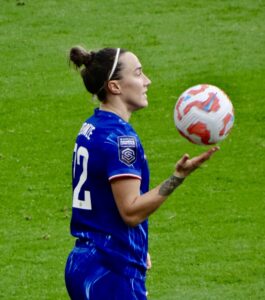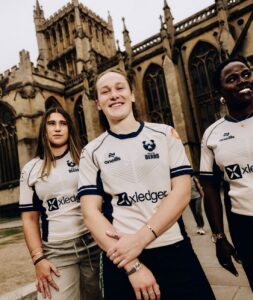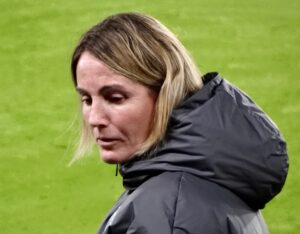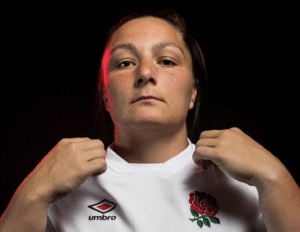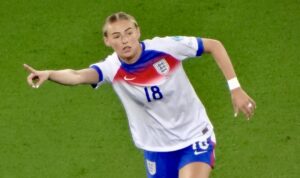“She should be one of the most famous women in history”
Director Ash Avildsen discusses his new film, Queen of the Ring, the untold story of women’s wrestling pioneer Mildred Burke, and how he brought her legacy of strength, resilience, and empowerment to the screen.
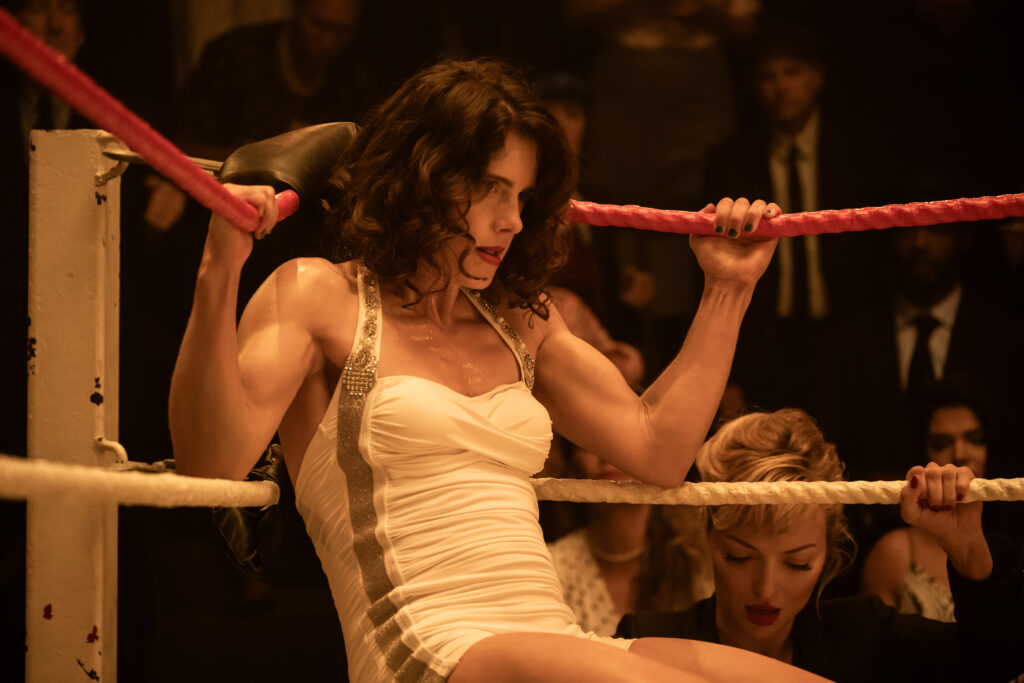
When Queen of the Ring hit American screens recently, audiences finally saw the story of Mildred Burke, a single mother who became one of the most influential and trailblazing wrestlers in history. And the film is now available in the UK.
Burke is dubbed as the first ever female million-dollar athlete, and director/writer Ash Avildsen wanted to show her story to the world.
He sat down with The New Women’s Sport Magazine to discuss why Burke’s legacy matters, how actress Emily Bett Rickards embodied the role, and why this film is about so much more than wrestling.
When did you first come across Mildred Burke’s story, and what inspired you to make a film about her?
“So when I read the book, I had never heard of her, and then when I read it, I was so just enamoured and inspired and entertained and enchanted reading it. The fact that I had never heard of her, and no one I knew had heard of her, actually inspired and motivated me more to want to figure out how to get a movie made on her life.
“It was just so unique. I learned so much that I never even knew, like that it was illegal for women to wrestle each other in the U.S., and that they could start off against men but not women against women.
“The single mother with her son against the world really spoke to me, because I grew up in an unorthodox household as well, with a single mom.
“Her story felt so timeless. She was so resilient, and that theme of not letting your passions and dreams be beaten down by the world will never go away. I was just in love with the book, and because no one knew who she was, that made me feel like it was even more important to get it out there.”
Why was it important to tell the story of a female athlete, something still rare in sports films?
“There wasn’t one specific thing. A lot of the nuance of her story and what makes it unique, is because she was a woman.
“It went hand in hand with everything she had to go through. Her being a woman facilitated a lot of the most compelling moments in her story.
“But I don’t want to marginalize or simplify her story just because of that. It’s so unique, and I hope it’ll inspire boys and girls alike. She went through so much darkness, but I wanted to tell her story with an inspirational feel and tone. I hope it inspires people, young or old who still have things they’re trying to overcome.”
Emily Bett Rickards gives an incredible performance as Mildred. What made her right for the role?
“It’s a fine line, having the charisma, the tenacity and resilience, but also being vulnerable. The duality of her bravery and fearlessness, while still being human and a mother, was key. Emily walked that line so well, and you really believe she is this woman.
“I had never seen her stuff before, so she wasn’t on my original shortlist. But when I stumbled upon her on an agency’s roster, I just got that instinctual feeling. Once we started talking, she fell in love with the story, read the book, and did so much research and now I can’t imagine anyone else playing her.”
Mildred Burke was unapologetically strong, decades before it was mainstream for women to embrace that kind of athleticism. Was that important to highlight?
“I don’t know if the struggles of someone like Mildred will ever truly go away. Sadly, there are still people, not just men, who believe there are things women should or shouldn’t do. Certain parts of the world are worse than others, but that challenge will probably always exist.
“I hope Queen of the Ring, even as a period piece, transcends its setting. It’s a timeless story that reminds people not to let society limit what they choose to do or be.”
Sadly, there are still people, not just men, who believe there are things women should or shouldn’t do.
Her story also shows resilience in her personal life as well as her sport. How important was it to show her full humanity?
“It has to be balanced. That’s what makes the ending worth that much more. She’s not a superhero, she’s not perfect, she’s still trying to figure it out, like we all are, one day at a time.
“Life isn’t like a movie that ties everything up neatly. It’s messy. Certain things work out, and others don’t, and that’s life. Even though her story is inspirational and triumphant, there’s still a lot of heartbreak.”
Mildred was also a single mother competing at the top level, something still rare in sport. How much did you enjoy showing that side of her life?
“That was one of the biggest things for me. You see in the end who her son becomes, in her corner. It’s hard enough for women to pursue things and considered unorthodox, but especially back then, and even now, being a mom shouldn’t mean choosing between motherhood and your dreams.
“The fact that she didn’t have to choose one or the other, and that her son was her ride or die, was so emotional. It reminded me of me and my mom growing up, trying to figure it out. I hope a lot of moms, sons, and daughters connect with that.”
Have you had any reactions from the wrestling community yet?
“For the U.S. release, there were a number of female wrestlers, Saraya [Bevis], The Bella Twins, Mickie James, who came to the premieres and helped spread the word. It seems to be landing well with female wrestlers and with Mildred’s own family, which means a lot.
“She should be one of the most famous women in history, especially in sports. But because her career peaked before television and journalism, her story was buried.
“Luckily, things are getting better, she’s now in the WWE Hall of Fame, and more people are finding out about her.”
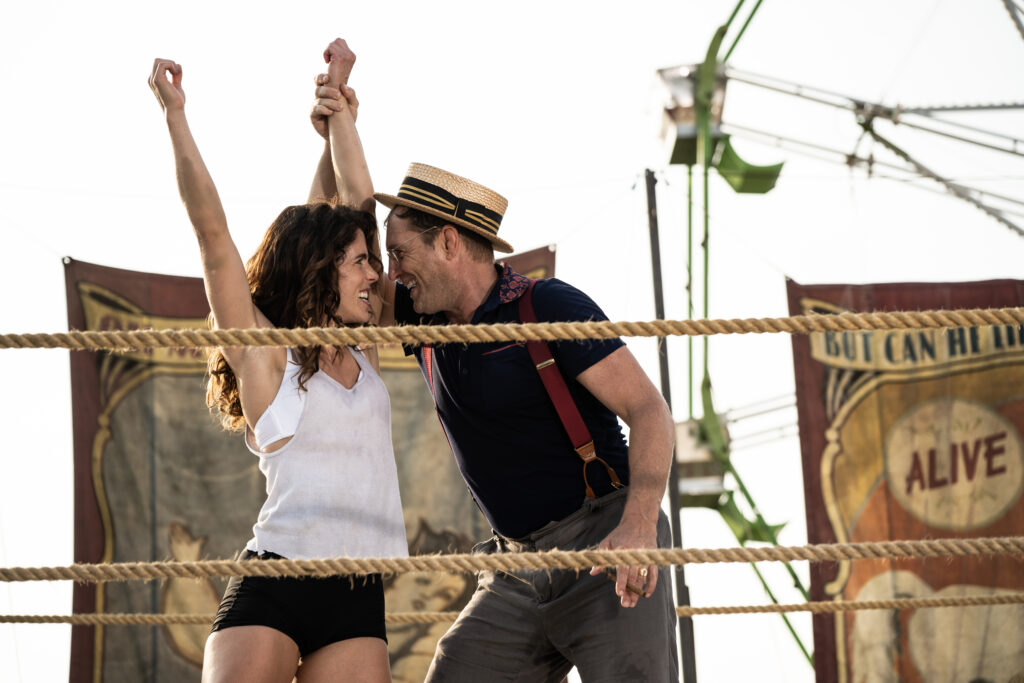
The film also portrays the abuse she suffered from her husband and promoter, Billy Wolfe. How difficult was that to handle?
“In the first act, we want to see why Mildred falls for him, and then he quickly shows his true colours. You’re seeing a woman be emotionally and physically abused, but she still has to deal with him in business because she has no choice.
“It’s a fine line to walk so that audiences still root for her and understand her choices.
“One of my favourite scenes is when she’s looking in the mirror, explaining why she’s not calling the police after being beaten. It’s incredibly powerful and you understand why she chooses not to in that moment.
“Again, it all goes back to women not having an equal platform, there was nowhere else to go.
“It’s like imagining an actress who wants to work, but there’s only one studio run by a Harvey Weinstein figure. What do you do? These women had to deal with Billy because there was no alternative.
“Billy wasn’t one-dimensional, though. As much as he was a monster, he also helped bring women of colour into wrestling for the first time. That duality makes the story more real, and it resonated deeply with audiences, especially women who’ve experienced similar cycles of abuse.”
Mildred Burke was an underdog in the truest sense, a single mother from a small town, waiting tables, who discovered wrestling and knew instantly it was her calling.
She risked everything and changed culture, starting off as an outlaw when it was illegal for women to wrestle.
In your director’s statement, you also mentioned your father, John G. Avildsen, who was also a director (Karate Kid, Rocky). Did reconnecting with him later in your life influence how you approached this film?
“It did. Some people will notice I gave it a very Avildsen ending, that was by design. I grew up not knowing him and once thought about changing my last name, but after we became close, I was proud to be an Avildsen.
“With Queen of the Ring, I didn’t have the freedom of fiction. It had to stay true to what actually happened, but his films influenced me. My favourite of his is Lean on Me, which, like this, is based on a true story. I hope Queen of the Ring will stand the test of time the same way.”
Finally, why should fans of women’s sport see Queen of the Ring?
“She was an underdog in the truest sense, a single mother from a small town, waiting tables, who discovered wrestling and knew instantly it was her calling.
“She risked everything and changed culture, starting off as an outlaw when it was illegal for women to wrestle.
“It’s an incredible true story with twists, turns, and an amazing performance by Emily Bett Rickards. And I think it’s got a great main event, too, a big payoff fight that delivers everything you want from a sports film.”

More than a wrestling biopic, Queen of the Ring is a reminder of how far women’s sport has come and shines a light on an athlete whose story should never have been overlooked.
Queen of the Ring is now available to watch on UK streaming platforms including Apple TV, Prime Video, and YouTube.


